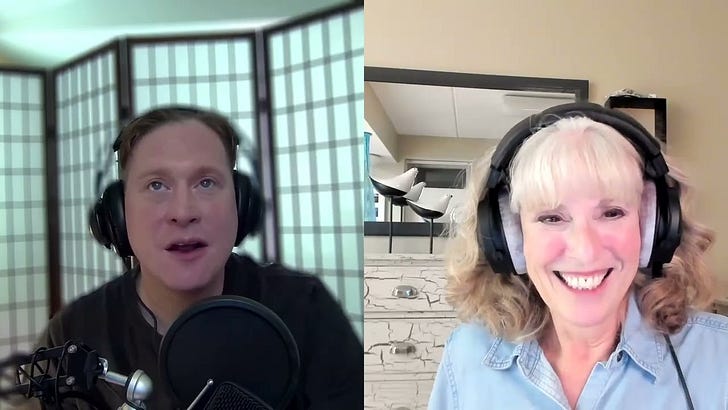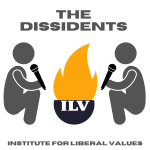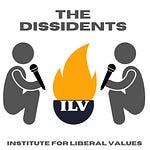This week we’re starting something a little different as we transition to using Substack as our main mode of communication. Each week, along with our podcast we will start to share a little more insight into what we are doing behind the scenes. This ties into our new mission to “create a prosocial conversation culture to uphold viewpoint diversity, build our constitution of knowledge, and advance pluralism.” We will continue to unveil more on this initiatve over the next couple of posts. Meanwhile, below the podcast, get a glimpse of what we’ve been up to and reach out with any thoughts, comments or suggestions.
The Dissidents Podcast
This week Mike Burke is back and joins Elizabeth for discussion about the neuroscience of polarized attitudes. A recent article suggests that regardless of which side of the political aisle we inhabit, those with more extreme views may experience similar neural activity and physiological responses to the same political content and emotionally charged language. Research participants who self-identified on the most extreme ends of the ideological spectrum exhibited the most so-called “neural synchrony effects.” Mike and Elizabeth talk about the implications of these similarities as well as other examples of what is often called the horseshoe theory, which suggests that those at the far ends of the political spectrum may view the world through a shared lens and that their behaviors and strategies are nearly indistinguishable. Mike describes his relevant article in which he argues that too often “those who claim to be the defenders of Western civilisation seem not to notice that they are the ones burning it down from within.”
Podcast notes
Topic article: de Bruin, D., & FeldmanHall, O. (2025). Politically extreme individuals exhibit similar neural processing despite ideological differences. Journal of Personality and Social Psychology.
A brief description of horseshoe theory appears here: https://vanderbiltpoliticalreview.com/12168/us/horseshoe-theory-in-american-politics/
Mike’s recent article can be found here: https://www.queermajority.com/essays-all/the-kremlins-lgbt-smokescreen
What we’re doing, thinking, reading…
Elizabeth Spievak
Elizabeth has been reading: Whittington, K. E. (2024). You Can’t Teach That!: The Battle Over University Classrooms. John Wiley & Sons.
From the publisher: The author is the David Boies Professor of Law at Yale Law School and a leading expert on academic freedom and American constitutional law and politics. Among his prize-winning books is Speak Freely: Why Universities Must Defend Free Speech. He is the founding chair of the Academic Freedom Alliance and a visiting fellow at the Hoover Institution. Whittington argues that argues that the First Amendment imposes meaningful limits on how government officials can restrict the ideas discussed on university campuses. In clear and accessible prose, he illuminates the legal status of academic freedom in the United States and shows how existing constitutional doctrine can be deployed to protect unbridled free inquiry.
Elizabeth is also very concerned about a “collegiality clause” added to a proposed contract for state college professors in Massachusetts. and has contacted FIRE for advice. Some of the proposed language appears below.
Unit members are expected to conduct themselves in their official relations with their fellow employees, students, members of the university community and members of the public, in a manner that enhances respect for, and confidence in, the unit member, the University and the Commonwealth. Unit members must not only perform duties in a wholly impartial matter, but must avoid any conduct which gives a reasonable basis or the impression of acting otherwise. Accordingly, professionalism, inclusiveness, and mutual respect in all aspects of their roles and the performance of their responsibilities shall be considered when evaluating “other professional activities” pursuant to Article VIII A(1) bii and (3) bii, and failure to adhere to these expectations will be regarded as neglect of a unit member’s professional duty.
The union has suggested the addition of “Any form of speech or conduct which is protected by the principles of academic freedom or the U.S. Constitution is not subject to this provision.” Given Whittington’s argument that professors’ assumptions about academic freedoms have been more hopeful than sound, the addition does not inspire Elizabeth’s confidence.
Ken Pope
Ken recently spoke at the Texas Public Policy Foundation’s panel, The Specter of Communism, with ILV advisor Brandy Shufutinsky. Stay tuned for his forthcoming podcast with TPPF.
1776 Forward
1776 Forward continues its work to advance their mission of building a freer society grounded in Philosophical Liberalism. Under their flagship bi-weekly Substack newsletter, The Philosophical Liberal, they have continued their deep-dive explorations into applying their statement on Philosophical Liberalism (posted on their website 1776forward.com). Having just completed the first of three parts to the series, the newsletter chats provide helpful lessons in how to apply the ideas of Philosophical Liberalism to achieve greater Freedom, Flourishing, & Greatness (both in one’s individual life, and in society at-large). Be sure to follow The Philosophical Liberal on Substack as they move into part II of the series.
In addition, their other main program of the Free Speech Forward (FSF) podcast recently celebrated its one-year anniversary of free speech conversations with liberty leaders across the political and religious spectrum. As part of the growth in the podcast, 1776 Forward and ILV recently partnered with the Free Society Coalition (FSC) to produce a new mini-series that will explore the connection between free speech and the American Declaration of Independence as we approach the 250th anniversary of the country’s founding. Each month in the year ahead, they will speak with FSC member orgs to explore how the principles of the Declaration can help renew Americans’ appreciation for the values that unite us while bridging some of the divides that separate us in the present day.
You can find their most recent podcast with Kofi Montzka here:
Please consider donating to the Institute for Liberal Values, a 501c3 non-profit organization at ilvalues.org. All donations go to support our continued programming to realize our mission to provide the skills and support required to build community where there has been division, encourage free expression where there has been censorship, and foster optimism where there is fear.
*To sponsor a specific event with your name or logo, please reach out directly to admin@ilvalues.org*









